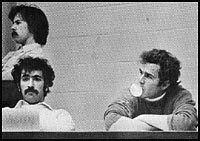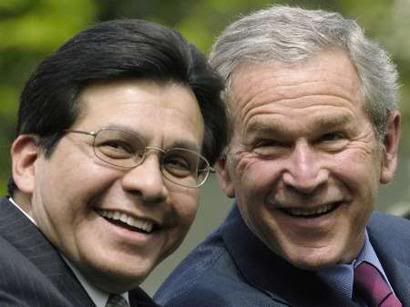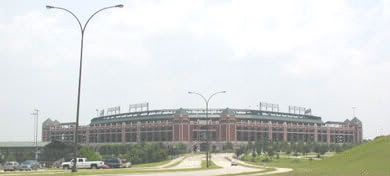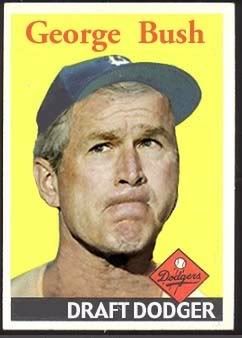The crazy moron made some big bucks by fronting the Texas Rangers, which he found the money to buy into by dumping his HARKEN shares on inside information before the bottom fell out on the stock. Here's a nice overview from DU's friends at Online Journal on the Rangers. The second piece from CBS MarketWatch describes HARKEN and how Bush avoided prison. Last is a nice overview of how a drunken greedhead got a family kicked out of their own house so a private baseball stadium could make more money off parking.
 Toughin' it out at Harvard.
Toughin' it out at Harvard.Bush' Texas Rangers' plot thickens into tax evasion and moreBy Jerry Mazza
Online Journal Contributing Writer
October 20, 2004�As if Bush's sale of his $606,000 share of Texas Rangers stock to owner Tom Hicks for $15 million wasn't enough, there's more from deep in the heart of Texas to nail the good old boy, namely the possibility of tax evasion. That is, Bush declared the proceeds as a long-term capital gain, which it wasn't, as opposed to ordinary income, which it was. This means Bush paid at the capital gains' rate of 20 percent as opposed to the ordinary income rate of 39.6 percent. Beating the IRS out of nearly 20 percent in additional taxes. But the fun doesn't stop there.
As reported by MakeThemAccountable.com, Bush had had prior business with Tom Hicks, who also was cofounder, with his brother R. Steven Hicks, of a radio company that merged in 1999 into AMFM, Inc. It was soon engulfed and devoured by Clear Channel Communications, of which old Tom became vice chair (I think the title is appropriate, don't you?).
Tom, a busy bee, is also chief corporate raider for the firm Hicks, Muse, Tate & Furst. In addition to being Bush's No. 4 career patron, Hicks, Muse wanted to dip into the $13 billion University of Texas (UT) endowment for takeover deals, sort of like Michael Milken's old corporate raider "treasure chests." And we all know what happened to Mike. Indicted in 1989 of 98 counts of fraud and racketeering. In 1990, banned from operating in the securities industry for life and sentenced to 10 years in prison for security fraud by then straight shooting New York D.A., Rudy Guiliani. Sentence later reduced to 22 months, served at a "Club Fed," a fenceless prison camp for low risk inmates. Ah well, life at the top. But let's move on . . .
Coincidentally, as Bush stepped into the Texas governor's office, Hicks was confirmed as a University of Texas regent, first chair no less. Hicks corralled some lobbyists to help pass a bill to create the UT Investment Management Co (UTIMCO). Love the acronyms. Then UTIMCO handed out contracts to private investment firms to "manage" pieces of the endowment�lots of foxes in the old hen house. When a media scandal (remember those) actually exposed UTIMCO's juicy contract deals with firms connected to Hicks and Bush, and even one that President Bush 1 reportedly had a piece of, well, folks weren't too happy. Nevertheless, the management fees to Hicks for "investing" the TU billions could easily have topped the $250 million he paid for the Texas Rangers. In so many words, Bush in his official duties as governor passed Hicks the money to buy the team.
CONTINUED...
http://www.jregrassroots.org/forums/index.php?showtopic=8788 
Of course, learnin' about insider trading doesn't hurt.
Bush Sold Stock Despite PromiseWASHINGTON, July 16, 2002 (CBS MarketWatch)
Two and a half months before George W. Bush sold his stock in Harken Energy Corp., he signed a "lockup" letter promising to hold onto the shares for at least six months, according to internal company documents obtained by the Washington Post.
The Post reported late Tuesday that the letter, signed by Bush on April 3, 1990, is now being compared with the account his lawyers gave federal securities regulators who examined the stock sale as a possible insider trade.
According to the Post story, the letter Bush signed promising to hold onto the stock was released by the Securities and Exchange Commission under the Freedom of Information Act. At the time he signed it, Harken was considering a public stock offering to raise money to solve a cash flow problem.
The President's lawyers have said that Bush had a pre-existing plan to sell his stock in Harken and other companies to pay a tax bill and a loan he owed for his stake in the Texas Rangers ball team.
In June 1990, Bush sold about $850,000 in shares of Harken, just weeks before the oil and gas company reported an unexpected loss. Eventually, the SEC forced Harken to restate its financials to show a loss of $12.6 million for 1989, disallowing the accounting it used for the sale of a subsidiary to a group of insiders. Bush was a director of the company, which had acquired Bush's own energy firm, Spectrum 7.
CONTINUED...
http://www.cbsnews.com/stories/2002/07/16/politics/main515266.shtml 
Then, there's using the power of government to kick the Curtes-Mathes clan off'n their own land.
Bush Condemned Property Via Eminent Domain to Build Rangers Stadium - And Made $14 Million Off the Deal
Posted in the database on Saturday, November 05th, 2005 @ 13:44:39 MST (486 views)
by Jon Pensito Review
Governing elite: The recent Supreme Court decision that allows local governments to use eminent domain to evict property owners in order to use their property for private development set off a howl on the Right.
To counter the ruling, Republicans in Congress are working on legislation that would cut off all federal funding to local governments who use eminent domain to evict property owners.
The president may have a hard time keeping a straight face when he signs the bill, however. In his past life as a baseball team owner, Mr. Bush profited from exactly this sort of eminent domain eviction - to the tune of $14.3 million.
The story was first reported by Texas reporter Robert Brice in May 1997, late in Bush�s first term as governor of Texas:
Since he took to the stump three and a half years ago to run for governor, Bush has railed against �big government.� On the very first day of his campaign, November 8, 1993, Bush told supporters in Houston, San Antonio, Austin, and Dallas that �the best way to allocate resources in our society is through the market place. Not through a governing elite, not through red tape and over-regulation, not through some central bureaucracy.�
But through the Arlington stadium deal, Bush, who owns 1.8 percent of the Rangers, has been personally enriched by using the �governing elite� and the �central bureaucracy� not only to confiscate land for private purposes, but to get a huge public subsidy for a stadium that generates profits for himself and the Texas Rangers. Though Bush�s present ownership percentage of the team is relatively small, the asset represents a large part of his personal wealth; moreover, Bush�s deal with the team includes a provision that will almost certainly multiply his future ownership interest to 11 percent.
Briefly, here�s what happened on the Ballpark deal. Bush and his partners in the Rangers convinced Arlington officials to:
Pass a half cent sales tax to pay for 70 percent of the stadium;
Use the government�s powers of eminent domain to condemn land the Rangers couldn�t or didn�t want to buy on the open market;
Give the Rangers control over what happens in and around the stadium;
Allow the Rangers to buy the stadium (which cost $191 million to construct) for just $60 million;
Bush and company went into action on the stadium in late in 1989, when Bush�s father was still vice president and as the project was getting off the ground he became president. The younger Bush�s company exercised its considerable political clout and used the Texas state government to take the property for the stadium involuntarily from its rightful owners
In April of 1991, the Rangers shepherded through the Legislature a bill would create the Arlington Sports Facilities Development Authority, a quasi-governmental entity endowed with the power of eminent domain. Shortly after the bill was signed into law by former Governor Ann Richards, three parcels of land located near the stadium, nearly thirteen acres in all, were condemned by the ASFDA. The land was owned by � the heirs of television magnate Curtis Mathes.
Among court documents is an unsigned Rangers memo by a team representative, discussing the history of the Mathes tracts. The representative notes that in his first contact with the Mathes family concerning the land, on November 6, 1990, �I was not well received.� The memo goes on to say that the ASFDA�s appraiser assigned the land a value of $3.16 per square foot, for a total value of $1.515 million. �An offer was made by the Authority at this price. This offer was rejected & the Sellers countered with $2,835,000.00 for all three tracts, i.e.: $5.31 p.s.f.� In mid-December, the ASFDA offered the Mathes heirs just $817,220 for the three tracts, far below even what the ASFDA�s first appraiser had suggested. The Mathes family refused to sell, and the ASFDA seized the land through eminent domain.
Glenn Sodd, a Corsicana attorney who represents the Mathes family, says he has found little evidence that Bush was directly involved in the decisions to condemn the property for the stadium. But he adds, �What happened to my folks was pretty audacious. It was the first time in Texas history that the power of eminent domain has been used to assist a private organization like a baseball team.�
(In May 1996), a Tarrant County jury found that the sports authority�s offer of $817,220 for the Mathes property was too low, and it awarded the Mathes heirs $4.98 million, plus accumulated interest. For the past year, the city of Arlington and the Rangers have been arguing over who will pay the tab.
Bush sold his interest in the Rangers in 1998 for $14.9 million. He had invested a total of $606,302.27 (in 1989) and was one of two managing partners.
http://www.lookingglassnews.org/viewstory.php?storyid=3349
Show me a liar and I'll show Thee a thief.